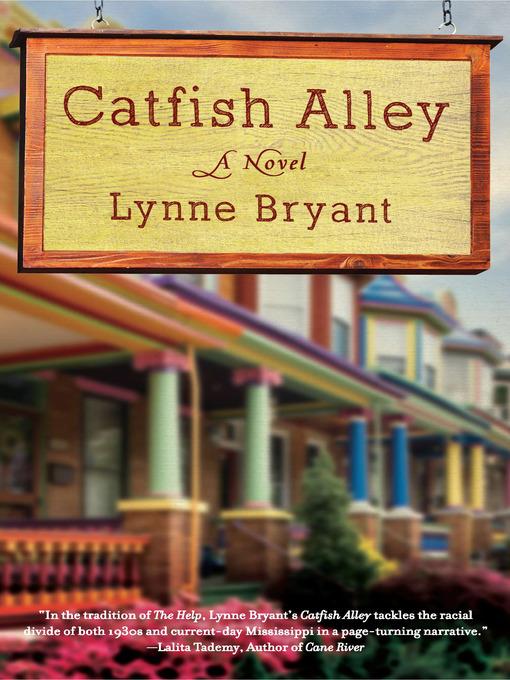
Catfish Alley
کتاب های مرتبط
- اطلاعات
- نقد و بررسی
- دیدگاه کاربران
نقد و بررسی

January 17, 2011
In Bryant's debut, middle-aged Junior Leaguer Roxanne Reeves throws herself into directing Clarksville, Miss.'s 2002 Pilgrimage Tour of Antebellum Homes and develops, with more trepidation (and community resistance), an African-American Historical Tour. Guiltily admitting to her ignorance of local black history, she asks 89-year-old Grace Clark, a retired African-American school teacher, to consult. Grace takes Roxanne to a part of town known as Catfish Alley; once the lively home of a hotel where Louis Armstrong played, the area is now dotted with warehouses like the one owned by Del Tanner, son of a notorious racist. Unbeknownst to Tanner, his warehouse once housed the first school for black children (and he's not happy when he learns about it). In particular, Grace remembers 1919, when she went to that school for the first time with her brother "Zero," and 1931, when Tanner's father lynched Zero and raped his girlfriend, Adelle, who became the first black nurse at Clarksville Hospital. Though Bryant's approach to narrative is perfunctory, her tale will appeal to readers who enjoyed The Help. The author accesses her own tumultuous Southern history to lend her enchanting tale much local color.

February 15, 2011
A well-intentioned debut of a woman finally rejecting the social and racial dictums of small-town Mississippi.
Roxanne Reeves, a restoration expert and director of the Clarksville Pilgrimage Tour of Antebellum Homes, is asked to research the possibility of offering an African-American tour of her town (suggested by the group's newest member, a Connecticut transplant who doesn't understand the nuanced tension between the blacks and whites in Clarksville). Hesitantly, Roxanne contacts Grace Clark, an 89-year-old ex-schoolteacher to help her uncover Clarksville's neglected history. Roxanne has no interest in the town's black history; according to her "the War is over and the blacks got their rights, so why do we have to dwell on the past?" But she does want to impress Louisa Humboldt (who needs her mansion restored) and so Roxanne is willing to traipse around Clarksville with Grace as she is shown ramshackle testaments to the hardships faced by Mississippi blacks during segregation. Grace shows Roxanne the old schoolhouse for black children, now the lumberyard's warehouse (whose owner, Del Tanner sadly discovers his father was in the KKK and involved in a lynching); the house of her best friend, Adelle Jackson, whose father was the town's first black doctor; and the black-owned Queen City Hotel, where Louis Armstrong played. Grace's youth is revisited through these tours, allowing Roxanne, who seems woefully uninformed regarding Jim Crow, to gain appreciation for the black community she and her social circle prefer to ignore. Along the way, Grace's tragic story unfolds, centering on the tale of her brother Zero, his quest to become a doctor and the violent fate he met at the hands of Del Tanner's father. Roxanne builds powerful bonds with the strong black women she encounters, which enables her to finally reveal the secret of her own less than glorious family origins.
Bryant's sprawling tale of segregation, perseverance and interracial friendships is heartfelt, if at times predictable.(COPYRIGHT (2011) KIRKUS REVIEWS/NIELSEN BUSINESS MEDIA, INC. ALL RIGHTS RESERVED.)

April 1, 2011
Wealthy Roxanne Reeves has been living a lie as a woman with an upper-class background and a stable life in a loving marriage, solidly in the social life of Clarksville, Mississippis antebellum historical set. When a moneyed woman from the North settles in one of the most imposing houses in town and suggests that the antebellum house tours include some homes on the black side of town, Roxanne is enlisted to make it happen. She meets Grace Clark, a retired black schoolteacher. Grace agrees to introduce Roxanne to the home owners but also asks Roxanne to take her to visit sites important to the history of black Clarksville. Grace teaches Roxanne about a history and a part of town of which she knows nothing and the long, troubled history of racial discrimination. Grace also conveys the remnants of a 1929 tragedy involving her brother, Zero, which plague the town down to the present. In the days they spend together, Roxanne also learns to appreciate her own humble beginnings and admire the strength, endurance, and close bonding she sees in Grace and her friends.(Reprinted with permission of Booklist, copyright 2011, American Library Association.)

























دیدگاه کاربران